Filter by
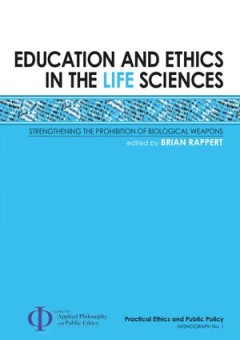
Education and Ethics in the Life Sciences
At the start of the twenty-first century, warnings have been raised in some quarters about how – by intent or by mishap – advances in biotechnology and related fields could aid the spread of disease. Science academics, medical organisations, governments, security analysts, and others are among those that have sought to raise concern. Education and Ethics in the Life Sciences examines a vari…
- Edition
- volume 1.0
- ISBN/ISSN
- 9781921666391
- Collation
- -
- Series Title
- -
- Call Number
- -
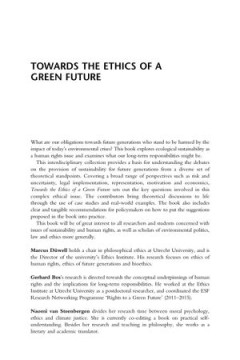
Towards the Ethics of a Green Future
What are our obligations towards future generations who stand to be harmed by the impact of today’s environmental crises? This book explores ecological sustainability as a human rights issue and examines what our long-term responsibilities might be. This interdisciplinary collection of chapters provides a basis for understanding the debates on the provision of sustainability for future genera…
- Edition
- -
- ISBN/ISSN
- 9781315115788
- Collation
- -
- Series Title
- -
- Call Number
- -
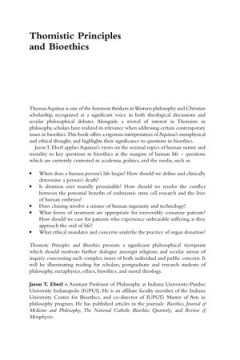
Thomistic Principles and Bioethics
Alongside a revival of interest in Thomism in philosophy, scholars have realised its relevance when addressing certain contemporary issues in bioethics. This book offers a rigorous interpretation of Aquinas's metaphysics and ethical thought, and highlights its significance to questions in bioethics. Jason T. Eberl applies Aquinas’s views on the seminal topics of human nature and morality to k…
- Edition
- -
- ISBN/ISSN
- 9780203966259
- Collation
- -
- Series Title
- -
- Call Number
- -
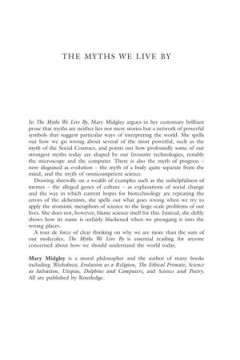
The Myths We Live By
Mary Midgley argues in her powerful new book that far from being the opposite of science, myth is a central part of it. In brilliant prose, she claims that myths are neither lies nor mere stories but a network of powerful symbols that suggest particular ways of interpreting the world.
- Edition
- -
- ISBN/ISSN
- 9780203480922
- Collation
- -
- Series Title
- -
- Call Number
- -
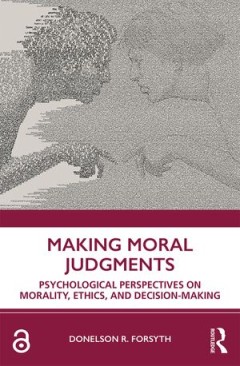
Making Moral Judgments
This fascinating new book examines diversity in moral judgements, drawing on recent work in social, personality, and evolutionary psychology, reviewing the factors that influence the moral judgments people make.Why do reasonable people so often disagree when drawing distinctions between what is morally right and wrong? Even when individuals agree in their moral pronouncements, they may employ d…
- Edition
- Edisi 1
- ISBN/ISSN
- 9781000710120
- Collation
- -
- Series Title
- -
- Call Number
- -
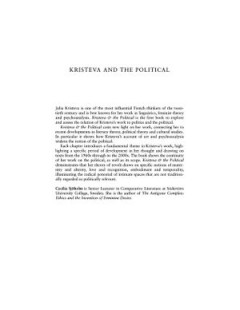
Kristeva and the Political
Julia Kristeva is one of the most influential French thinkers of the twentieth century and is best known for her work in linguistics. Even though her work has been very influential, the political implications of her writings have so far been neglected. Kristeva and the Political is the first book to explore the relation of Kristeva's work to the political and casts new light on her work, connec…
- Edition
- -
- ISBN/ISSN
- 9780203326954
- Collation
- -
- Series Title
- -
- Call Number
- -
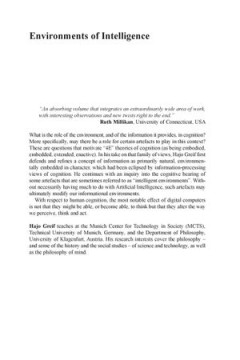
Environments of Intelligence
What is the role of the environment, and of the information it provides, in cognition? More specifically, may there be a role for certain artefacts to play in this context? These are questions that motivate "4E" theories of cognition (as being embodied, embedded, extended, enactive). In his take on that family of views, Hajo Greif first defends and refines a concept of information as primarily …
- Edition
- -
- ISBN/ISSN
- 9781315408101
- Collation
- -
- Series Title
- -
- Call Number
- -
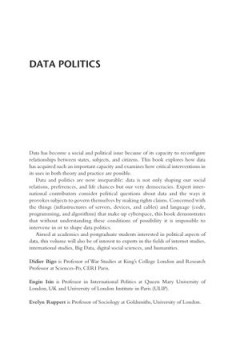
Data Politics
Data has become a social and political issue because of its capacity to reconfigure relationships between states, subjects, and citizens. This book explores how data has acquired such an important capacity and examines how critical interventions in its uses in both theory and practice are possible. Data and politics are now inseparable: data is not only shaping our social relations, preferences…
- Edition
- -
- ISBN/ISSN
- 9781138053250
- Collation
- -
- Series Title
- -
- Call Number
- -
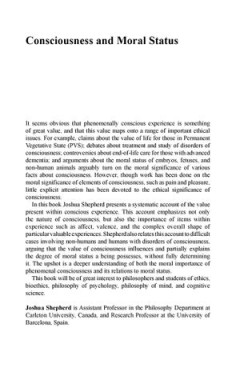
Consciousness and Moral Status
In this book Joshua Shepherd presents a systematic account of the value present within conscious experience. This account emphasizes not only the nature of consciousness, but also the importance of items within experience such as affect, valence, and the complex overall shape of particular valuable experiences. Shepherd also relates this account to difficult cases involving non-humans and human…
- Edition
- -
- ISBN/ISSN
- 9781138221611
- Collation
- -
- Series Title
- -
- Call Number
- -
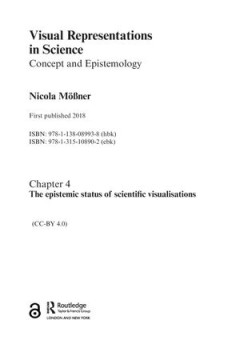
Chapter 4: The epistemic status of scientific visualisations
As the considerations in the previous chapter made clear, visual representations are, without doubt, part of many epistemic processes in contemporary science. Scientists present diagrams in their publications and talks to communicate their research results. They investigate computer-generated images as substitutes for research objects. Drawings in textbooks are used to educate novices, to intro…
- Edition
- volome 13.0
- ISBN/ISSN
- 9781315108902
- Collation
- -
- Series Title
- -
- Call Number
- -
 Computer Science, Information & General Works
Computer Science, Information & General Works  Philosophy & Psychology
Philosophy & Psychology  Religion
Religion  Social Sciences
Social Sciences  Language
Language  Pure Science
Pure Science  Applied Sciences
Applied Sciences  Art & Recreation
Art & Recreation  Literature
Literature  History & Geography
History & Geography